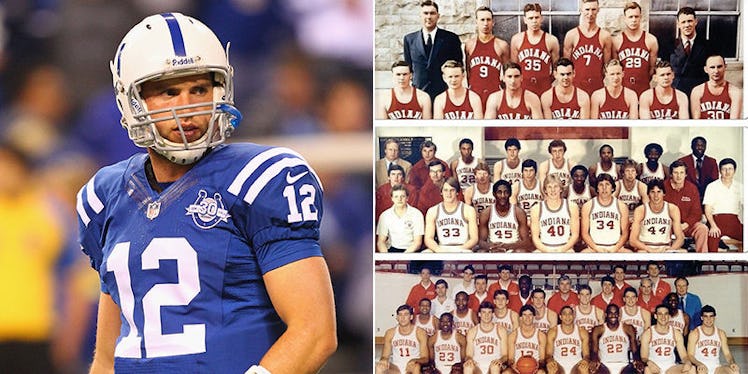
How Indiana’s Discriminatory Law Could Change The State's Sports Forever
Last week, Indiana Governor Mike Pence signed Indiana Senate Bill 101 into law.
Though it was described as a “religious freedom” bill for the state, the Religious Freedom Restoration Act is seen by many as nothing more than legalized discrimination against gays and lesbians.
In short, based on religious beliefs, a business can refuse to serve members of the LGBT community.
And in the age of Michael Sam, Jason Collins, Derrick Gordon and Robbie Rogers, you better believe the athletic community will not stand on the sidelines of this national debate.
.@GovPenceIN, is it going to be legal for someone to discriminate against me & others when we come to the #FinalFour? http://t.co/uBlKbIf8YK — Jason Collins (@jasoncollins98) March 23, 2015
"NBA on TNT" analyst Charles Barkley, who’s currently working with CBS to help anchor its NCAA tournament coverage, made his thoughts on the matter pretty clear.
In a statement to Sports Illustrated, Barkley said,
Discrimination in any form is unacceptable to me. As long as anti-gay legislation exists in any state, I strongly believe big events such as the Final Four and Super Bowl should not be held in those states’ cities.
NCAA President Mark Emmert -- who’s often cast as anti-progressive for his staunch belief paying student-athletes would damage traditions -- wasn’t quite as blunt as Barkley, but he shared similar sentiments.
Speaking with ESPN’s Andy Katz, Emmert said,
I’m anxiously awaiting whatever clarification that the legislature can bring forward to this bill so we can really know what it means and what it doesn’t mean. As it becomes better understood, we’re going to have to sit down and make judgments about whether or not it changes the environment for us doing our work and for us holding events.
Emmert also told The Indianapolis Star,
We don't want to, because of political activity, disrupt an event that's been in the making for so long, (and now) you've changed the experience for the student-athletes. But if we have to move events, we'll do it.
And we’re not just talking about this year’s Final Four.
To give you an idea of how sports and the state of Indiana are intertwined in the past, present and future, consider this: The Big Ten conference has held the football championship at Lucas Oil Stadium in Indianapolis since 2011, and it's slated to continue to do so until 2021.
It's also prepared to have its men’s basketball tournament at Bankers Life Fieldhouse in 2020 and 2022.
The conference’s women’s tournament is scheduled to take place in Indianapolis from 2017 to 2022.
The US Gymnastics Championships and next year's Olympic diving team's trials will take place in Indianapolis in the near future.
After this year, the Final Four is set to return to Indianapolis in 2021 while the women’s national semifinal is scheduled to take place there next spring.
Did I mention the NCAA has been headquartered in downtown Indianapolis since 1999?
Oh, and Indiana’s capital is also bidding to host the Super Bowl in 2019.
Recent studies have shown that the NFL’s Championship Game can generate anywhere between $200 million and $500 million at various levels of the host state’s economies.
And speaking of the NFL, the league has held its annual combine in Indianapolis every year since 1987.
Sports Illustrated football writer Robert Klemko thinks the passing of SB101 should signal an end to that nearly three-decade-long relationship.
Hate is now Indiana law thanks to #SB101. Never been a better time to move the NFL combine out of Indianapolis. — Robert Klemko (@RobertKlemko) March 26, 2015
That’s the last thing Colts owner Jim Irsay wants, and he made sure to voice the Indianapolis Colts’ official position on Twitter.
The Colts have always embraced inclusiveness, tolerance, and a diverse fan base. We welcome ALL fans to Colts Nation. ONE FAMILY! — Jim Irsay (@JimIrsay) March 30, 2015
Smart move, Jim.
While the Religious Freedom Restoration Act wouldn’t actually come into effect until July, and it remains to be seen whether there will be any amendments or a complete repeal of the law altogether, it’s overwhelmingly clear it is the privilege, not the right, of any state or city to host national sporting events.
And when the rights and freedoms of those who would attend those events are threatened, that privilege should be revoked -- and with it, any and all financial gain Indiana stands to make.
Last year, The Dallas Morning News estimated the Final Four would generate about $20 million in ticket revenue alone. That’s for three games played between Saturday and Monday.
These are still early days in the aftermath of SB101’s passing, but the sports community's unprompted response through both traditional and social media is both admirable and necessary.
Often, the NCAA and the NFL, specifically, are chided for having too much power and undue influence, so it’s refreshingly humane to see them use their status to stand up for what’s right.
USC Athletic Director Pat Haden is the latest member of the athletic community to stand against SB101.
Haden is the proud father of a gay son, and he will not be attending the College Football Playoff's selection committee meeting in Indianapolis this week.
I am the proud father of a gay son. In his honor, I will not be attending the CFP committee meeting in Indy this week. #EmbraceDiversity — Pat Haden (@ADHadenUSC) March 31, 2015